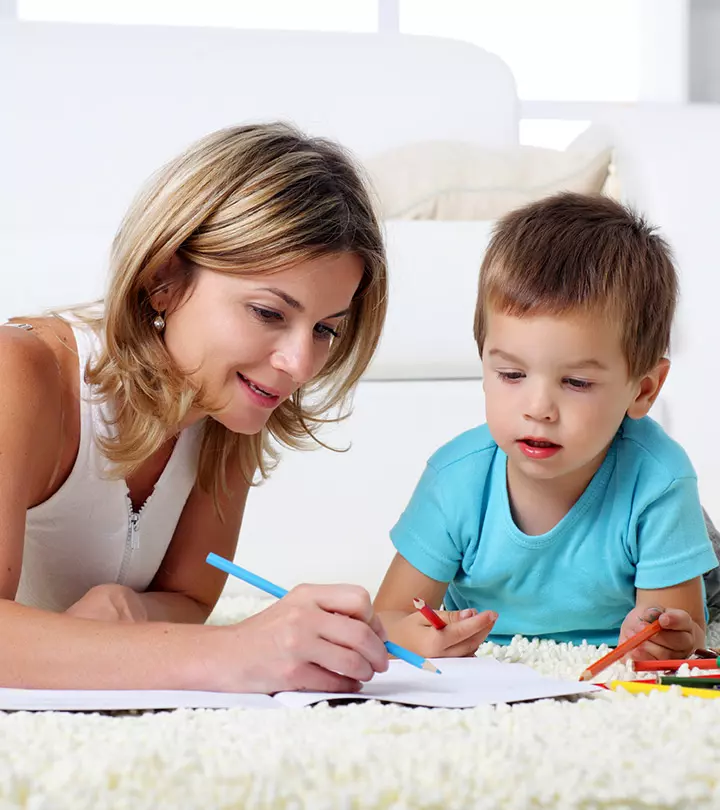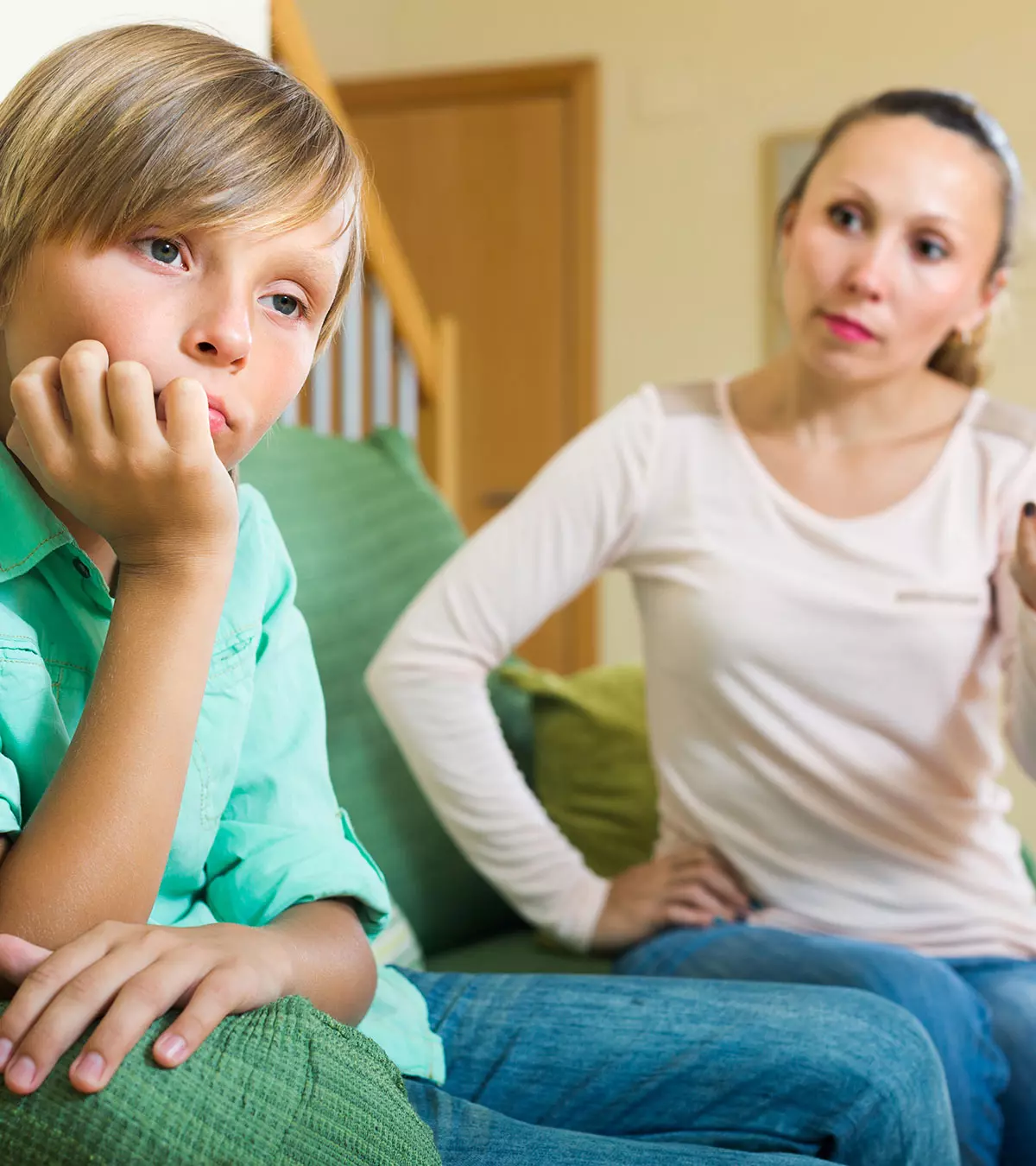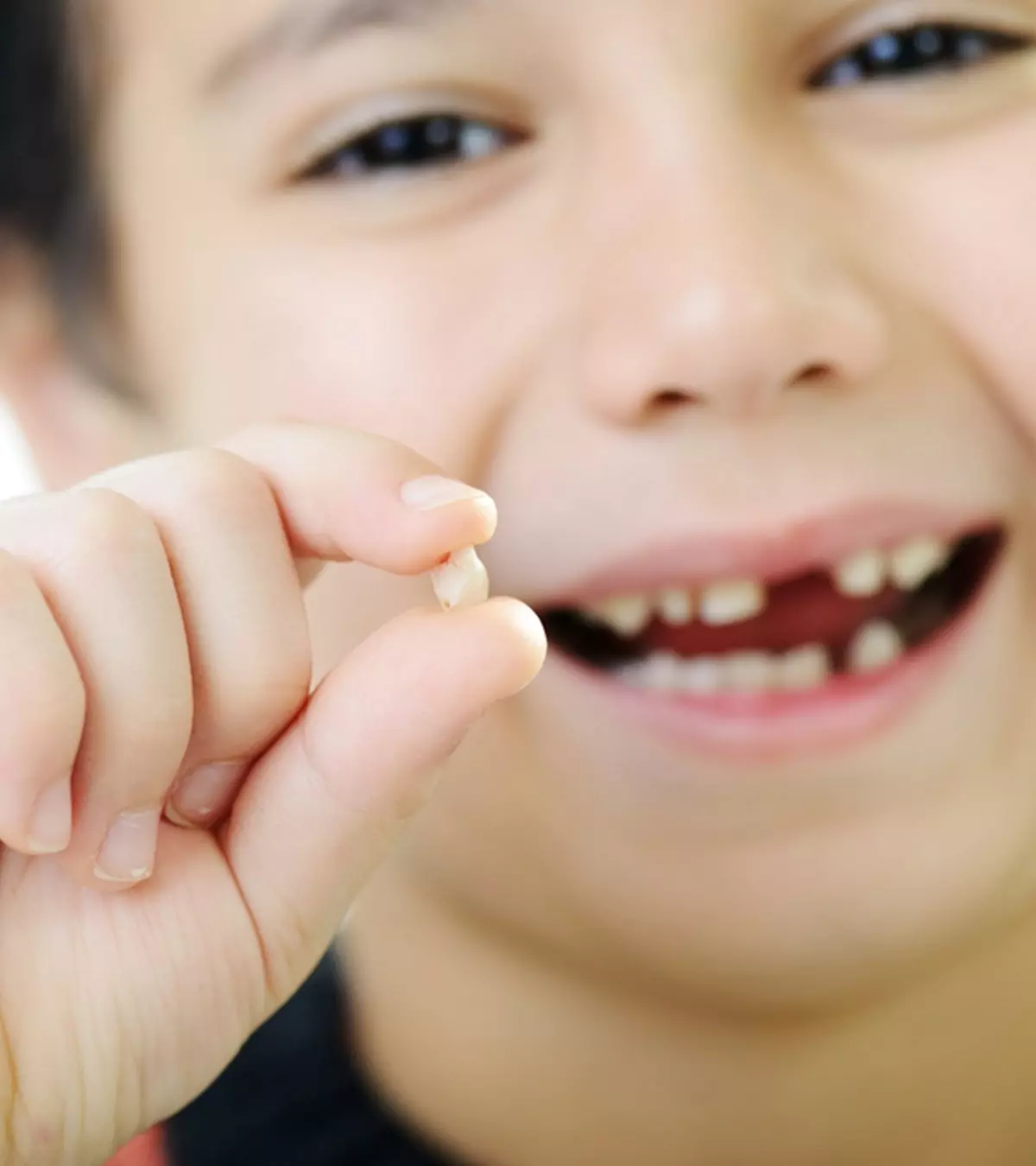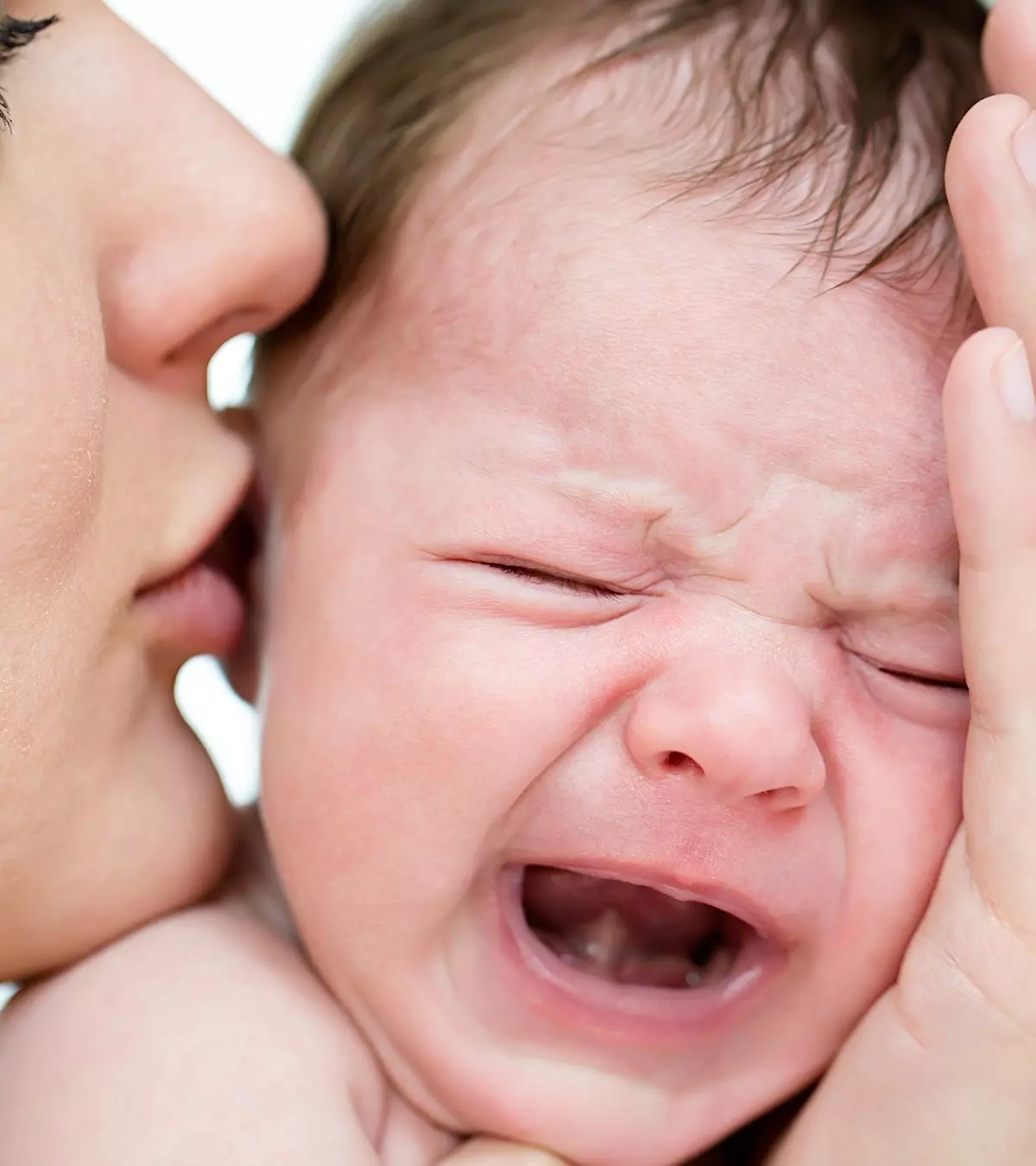
Image: Shutterstock
Grounding kids involves curtailing a child’s privileges for a set period, encouraging them to think over their actions, and finding remedies to correct them.

This discipline technique helps teach children the consequence of breaking the rules and the importance of appropriate limits and boundaries. In a way, grounding helps parents enforce rules. However, how a parent uses this technique determines its effectiveness.
Some parents keep their child home from all the activities after school hours, while others confiscate their phone, disconnect Wi-Fi, or refuse the child to have any peer interaction for a day or two. Whatever rules you set for grounding, it’s important to approach the situation with mindfulness and intentionality. Remember that you may unintentionally do more harm than good if you ground children for vague reasons or ground them excessively. So analyze the situation calmly before you proceed.
Read on as we take you through some common reasons why parents ground their children, the side effects this discipline technique can have, and a few tips for grounding children effectively.
Key Pointers
- Parents generally ground their children for being disobedient, disrespectful, or inappropriate behavior.
- Unreasonable grounding could be problematic.
- Children who are grounded often may develop anxiety, rebellious attitudes, or sometimes hold a grudge against you.
- If you must use grounding as a last resort to punish your child, be compassionate, talk to them in peace, and make them aware of the consequences in advance.
Reasons Parents Use Grounding As A Punishment

Parents use grounding as a consequence or punishment for kids for various reasons. The following are the most common ones.
1. Disobedience

If you have told your child to behave in a particular way, and they have deliberately overlooked your instruction.
2. Violence
can make them violent with you or other children, including siblings. They might bully someone or fight with them.
3. Disrespect
Sometimes, a disobedient child will answer with a rude comment or even a contemptuous facial expression to someone in authority at home, in the community or at school, usually with adults.
4. Lying
Children may lie to get out of tricky situations, avoid getting in trouble or even shift blame to others.
5. Stealing
Another issue parents may face is their children stealing from them or others and they need help learning how to curb this behavior so that it does not become a habit.
6. Bad habits
Some children get into various bad habits other than lying. Such bad habits in kids might impact their social and emotional development.
Side Effects Of Grounding Kids
While grounding kids might bring about the result you want on the surface, grounding has potential for a few negative side effects when not done right.
1. They might hold a grudge against you

If you have caused them humiliation among their friends by grounding them, your children might hold that as a grudge against you. They might even start comparing you with the parents of their friends. While this behavior is more common in tweens and teenagers, younger children might also harbor similar feelings due to emotional regulation challenges.
2. They might develop an irrational fear or anxiety
If you ground your child without giving them a proper reason or to severe for the infraction, they might doubt or wonder about their choices and actions because they wouldn’t know what could earn them a grounding and the worry could lead them to develop an irrational fear of punishment and could cause more problems, including increased emotional problems such as anxiety.
 Do remember
Do remember3. They might become defiant
While younger children might be afraid of being grounded, older children, especially teens, might become rebellious as a result of it. They might do things on purpose to annoy you. In general, if you have to ground your child for the same mistake more than two times, it suggests they are not learning from it, and you need to consider other options.
4. They might learn to wear you down
Some children have an uncanny knack for repeatedly requesting something that they want until you give in to their request. Once your children know how long you take to break down or how to pit parents against each other, they will ask you repeatedly until it is almost a power game that they hope to win. If the grounding lasts only until you hold out and not until the specified period you had decided in the beginning, it could backfire and teach them their methods work. It is usually better to start with the least severity of grounding than to go against your own word and give in.
5. They might get confused

You must try to connect the consequence to the behavior. For instance, if they drop the television remote repeatedly after you have told them to be careful, you can switch off the television. However, if you switch off the television for every sign of misbehavior, they might get confused about why they are getting grounded. They might eventually lose interest in watching television altogether or look for some loophole for watching it, such as watching TV at their friend’s place.
Overall, punishment may not always bring about the results intended, and a different method may be necessary. Rebecca Eanes, mother of two boys and bestselling author, talks at length about how she would initially discipline her kids. She writes, “I tried punishment. When my firstborn was three, we wore out the Time-Out chair for a while. I tried counting to three and then sending him to his room. I tried behavior management charts. I took away his toys.”
Seeing that this method brought about little to no results, Eanes changed her approach. She adds, “When my children were young, I switched from Time-Outs to Time-Ins. During a Time-In, the child is invited to sit in close proximity to the parent or caregiver and is guided in calming down their brains and bodies so they can absorb the lesson. This is called ‘co-regulation’ and is an important foundation for the ability to self-regulate (i).”
What You Should Do When Grounding Your Child
Grounding a child might seem to be the only way forward for you to discipline your child. However, you need to do certain things to make grounding effective (1) (2) (3).
1. Define conditions and consequences in advance
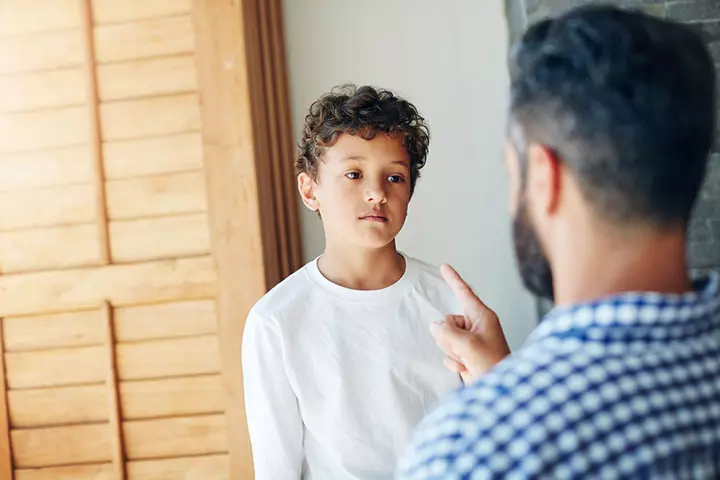
Instead of issuing vague instructions, such as “Behave well or else,” give your child explicit instructions with the consequences. For example, you can say, “If you drop the television remote, you will not be allowed to watch television for two days.”
Depending on your child’s age, you can increase or decrease the intensity and nature of the punishment. You should also ensure your child is clear about the reason for which they are getting grounded.
Rules are best when written down, reviewed with children and tied to specific consequences.
 Point to consider
Point to consider2. Focus on short-term expectations
Children may find it challenging to concentrate on long-term goals. Thus, you should give them instructions that they can focus on. Instead of saying, “You should study well so that you do well at the end of the year,” you can say, “Complete this homework today, and you can study for the test tomorrow.”
And when your children complete the required task, acknowledge it. Positive reinforcement is an excellent way to shape good behavior.
3. Start a conversation
If your child has done something wrong, the first thing you should do is start a conversation with them. Give them complete attention and create an environment where they feel safe to discuss anything with you, so they can learn from mistakes without the fear of being judged. This is the best way you can offer them advice on the correct course of action.
If your child is worried about you losing your temper, they will freeze and not be open to accepting guidance from you. If your temper flares up, it is never too late to apologize – children learn from your mistakes and repairs, too!
4. Ask your child what they think

Let your child talk and express their thoughts. They must have thought in a particular way to arrive at their final decision. This helps you understand what made them perform a specific action.
Although it might be tempting to correct each thought as they narrate it, practicing self-regulation is crucial to remain calm and letting them finish what they have to say before you offer them advice. Allowing children to express their thoughts out loud could give them a new perspective on their actions.
5. Discipline based on intent and not actions
If your child has done something inappropriate in a fit of anger, focus on the intent of the act instead of the act itself. For example, if they have broken something in anger, they should be taught the correct way to handle the anger instead of focusing on the broken item.
This teaches children that while they can vent, they cannot destroy things or harm people. This is another way to teach children that actions have consequences.
Eanes continues to explain why she does not go down the grounding route and what she does instead. She says, “They make mistakes, and we discuss them. Never once have I believed that banning them from the things they love would make them better people. I don’t think forcing them to stay in their room for days or weeks on end will change their hearts and minds.
“So, instead, I’m clear about boundaries. These are about what I will accept and what I will do. I allow natural consequences to take effect when appropriate. For example, if you don’t study, you fail. That’s on you. You’ll repeat the semester. If you bust your iPhone screen, you can pay for a new one. And I give grace because I realize that messing up is just part of growing up.”
6. Do not overdo it

Cutting down on a child’s favorite activities is one of the most effective ways of grounding a child. However, if you overdo it, your child might become resentful instead of learning from the grounding. Often you can simply limit even a portion of their time with a favorite activity but not take it away completely.
7. Keep groundings short
Long-term groundings seem to do more harm than good. Children, especially when they are older, find ways to cheat or work their way around the punishment. Also, long groundings do not allow you to reinforce proper behavior.
If your children have done something that warrants a long grounding, you might want to consider other methods for disciplining them.
8. Avoid complete grounding from social media
Even if you find it tempting to stop your child from using social media, it might be detrimental to their social development. Besides connecting with their friends, children also use social media to stay updated on their schoolwork and keep abreast of the news. By taking away their phones or banning the use of social media, you are cutting off all contact.
This could lead to more resentment, and your children might be unwilling to change their behavior. It could also lead to anxiety. Instead, you can allow limited time for access and set certain boundaries during that time.
9. Give them chances to reduce their grounding
Allow your children to “trade” their grounding for good behavior. This might be anything you choose, such as asking them to do chores around the house or complete their homework on time. If your child displays good behavior continuously, you can reduce the period of grounding.
10. Give your child an opportunity to fix their error
When you have talked about your child’s misbehavior, offer them a chance to fix the problem. This will give your child an opportunity to learn the different ways they can fix their mistakes.
For example, if they have hurt a friend at school, let them come up with ways to apologize – a handwritten note for example. These consequences may help them learn to analyze their actions and gain empathy for others.
11. Be empathetic

Remember that your child is just a young person trying to navigate their way around the world. Put yourself in their shoes and try to empathize with their situation instead of being angry at them. Consider if there are any underlying sensory issues or environmental factors that may be contributing to their behavior.
When you begin to empathize with your children, you automatically start trying to find ways to rectify the problem instead of shouting at your child and grounding them.
Open communication is the key to a healthy parent-child relationship. Your child will feel more confident about sharing the different aspects of their life with you and come to you willingly for advice.
Frequently Asked Questions
1. At what age should I start grounding my child
You may try it for kids around 10. The grounding technique of discipline might work well for older children as they would no longer like the ideas of time-outs or sweet words. (4).
2. How can I ensure that grounding is effective and not damaging to my child’s emotional health?
To ensure grounding is effective and supportive rather than damaging, approach it as a tool for learning, not punishment. Set clear expectations beforehand so your child understands the behavior that led to the grounding. Keep it proportionate, short, and connected to the issue, for example, limiting screen time for a specific time frame if misused. Remain calm, avoid harsh language, and communicate openly about the impact of their actions. Afterward, discuss healthier alternatives for next time. This balanced approach ensures your child feels guided and valued, promoting responsibility while preserving their emotional health.
3. What can I do instead of grounding my child?
To begin with, manage your anger and try to comprehend your child’s emotions without judging them. Once they know they can trust you, they feel safe to engage with you. Then, you may focus on the underlying cause of inappropriate behaviors and possible ways to deal with them effectively (5).
4. How can I ensure my child has fun while grounded?
If your child is under punishment, you may ask them to go on a walk, read books, consider things they have been punished for, write an apology letter, and help you with the chores. These activities can allow children to introspect their actions. Besides, they can help children learn coping strategies that facilitate healthy anger and stress management.
5. Why is it important to communicate with children about the reasons for grounding and what they can do to avoid being grounded in the future?
It is important to communicate with children because it helps them understand the consequences of their actions and encourages them to take responsibility for their behavior. By explaining the reasons behind the punishment, children can learn from their mistakes and make better decisions in the future.
6. How can parents avoid using grounding as a punishment for their frustration or anger?
Parents can take a break to ease their emotions or do calming and relaxation activities like meditation and breathworks. They can also use positive discipline strategies, talk to their children about how their actions make them feel, use natural consequences, and seek support from a professional if needed. Punishment should be a last resort. The focus should be on teaching the child rather than just punishing them.
7. What are some alternatives to grounding my child?
Instead of using traditional grounding, consider trying alternative approaches to guide your child’s behavior. When your child does something good, acknowledge it with kind words and a small reward as positive reinforcement. If your child is upset, suggest a short break to calm down, providing a chance for reflection without being overly strict. Restricting certain privileges, like screen time, outings, or special activities, can be an effective punishment. Engage in open conversations about expectations about their behaviors and consequences, ensuring your child understands the rules. Also, involve them in discussions on resolving conflicts. Using age-appropriate positive reinforcement for kids that goes with their personality helps them learn good behavior.
You must discipline your child and teach them the right things. However, going too far with disciplining might eventually push your child away from you. Also, grounding kids for various reasons, such as disobedience, lying, or bad habits, may upset them. However, it is also essential that you are doing this for their benefit and ensure that they understand their mistakes and do not hold grudges against you. So use grounding cautiously, centering it around behavior correction and not punishment. Also, remember to be empathetic towards your child and provide them with a safe space so they know that you have their best interests at heart.
Infographic: What You Should Do When Grounding Your Child
When grounding your children, you must be careful to be neither too strict nor too lenient with them. If you’re restricting your child from certain activities, they must learn something from this experience. So understand the dos and don’ts of grounding children to get a fruitful result.
Some thing wrong with infographic shortcode. please verify shortcode syntax
Illustration: Effective Ways To Ground Your Kids
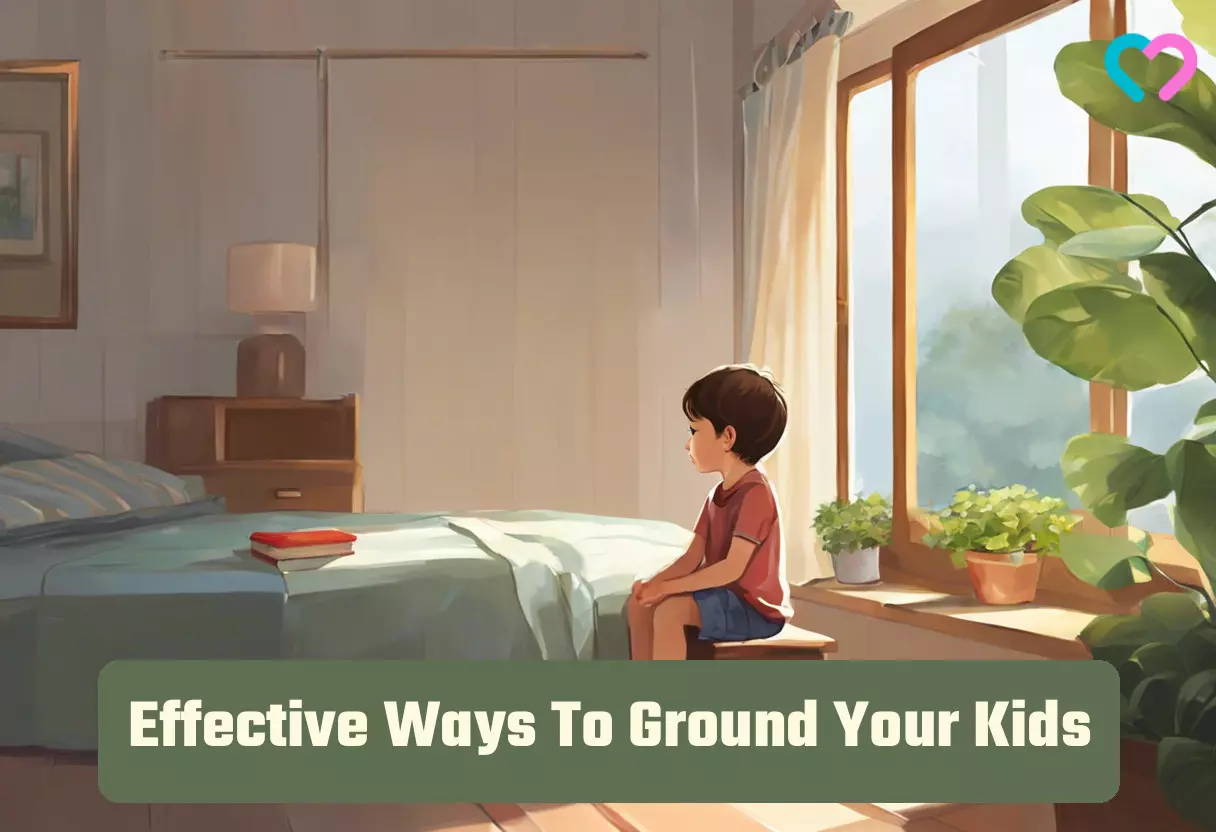
Image: Stable Diffusion/MomJunction Design Team
Get ready to learn and experience a fantastic grounding activity suitable for both children and adults by the Squeeze Hug. This incredibly simple yet highly effective technique will foster a deep sense of connection and grounding within yourself.
Personal Experience: Source
MomJunction articles include first-hand experiences to provide you with better insights through real-life narratives. Here are the sources of personal accounts referenced in this article.
i. I’ve never grounded my teenager – here’s why;https://genmindful.com/blogs/mindful-moments/i-ve-never-grounded-my-teenager-here-s-why
References
1. Instead of Grounding Your Teen, Put Them to Work; Regents of the University of Michigan
2. Modified Grounding; Center For Effective Parenting
3. Grounding as a Method of Discipline – Guidelines for Parents; University of Nebraska Medical Center
4. Discipline: Job Grounding; Tufts Medical Center
5. Instead of Grounding Your Kid: 12 Steps To Teach a Lesson; The Family & Youth Institute
Community Experiences
Join the conversation and become a part of our nurturing community! Share your stories, experiences, and insights to connect with fellow parents.
Read full bio of Dr. Margaret Ann Dixon
Read full bio of Nisha Bharatan
Read full bio of Harshita Makvana
Read full bio of Apoorva K






